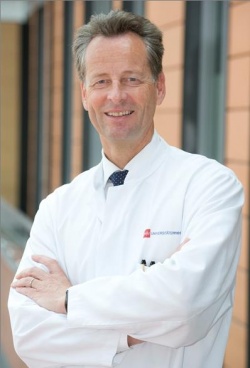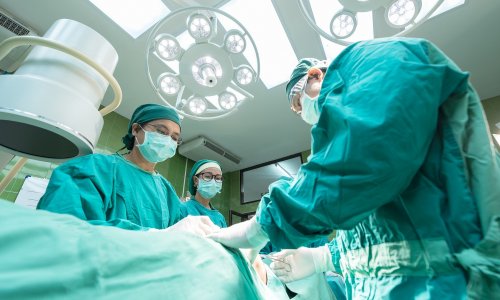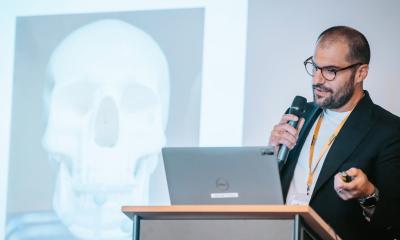Interview
Multidisciplinarity is the key for gastroenterologists
At the close of the Gastrointestinal Medicine and Surgery meeting in Leipzig, Professor Peter R Galle, Congress President of the German Society for Gastroenterology, Digestive and Metabolic Diseases, spoke with EH about today’s emphasis on interdisciplinary exchange and the need to augment cooperation even further.
Report: Chrissanthi Nikolakudi

‘Gastrointestinal medicine and surgery without interdisciplinary working would be inconceivable,’ Prof. Galle emphasised. ‘We specialists in internal medicine are closely networked with surgeons and other specialists. In the case of stomach cancer, for example, if a patient is diagnosed via endoscopy the endoscopist carries out the biopsy, the pathologist makes the histological diagnosis, the surgeon operates on the patient and, before this, the radiologist would have been consulted to assess the potential extent of the disease in any other areas away from the stomach. Gastrointestinal medicine and surgery are prime examples for a real interdisciplinary way of working – in daily clinical practice.’
Surgeons, he pointed out, expect real-time, good quality imaging to help procedures. ‘We also expect high quality support from pathologists. They have to make frozen sections during surgical procedures, have to attend clinical-pathological meetings and also need to provide information regarding the aggressiveness of tumours.’
Personalised medicine
‘The development of personalised, molecular-genetically based diagnosis will lead to treatment in the next step. In this context, RAS oncological diagnosis for colorectal cancer plays the most important part. If a mutation in the RAS gene is present, the use of biologically active substances, so-called antibody therapies, will be different to cases where the mutation is not present.
Furthermore, we can learn from other diseases, in haematology for instance. With liquid tumours there is no limit to the availability of sample material. In gastrointestinal medicine this is much more difficult – sometimes we have no tissue available at all. Therefore we work in all possible manners and, in the case of liver cancer for instance, utilise personalised diagnosis and treatment.’
Health insurers’ negativity
‘During the initial phase it is an additional service provided that is not billed separately. ‘The flat rates per case system works with full settlements, meaning that when a new method of treatment becomes available there will initially be no allowance for it in the reimbursement system. ‘We do indeed have initial problems with most of the new or experimental procedures.’
Quality assurance – compliance entails lots of work
‘Initially, more quality also means more work. However, quality also can help to relieve strain. A quality-based approach can, for instance, ensure that junior doctors work in the safest possible way.
‘Quality assurance is basically an investment. We have to improve our documentation and develop more standard operating procedures (SOPs). These provide guidelines and are therefore indispensable.
‘Personally, I would even say there are only two things that should be important in medicine regarding billing: Indication and quality. The first question is whether a treatment is necessary and whether it can be specifically developed – and, if so, whether it is of good quality. Once these two simple questions have been answered, everything else is of lesser importance.
This is why we included quality assurance measures in the whole series of events at our congresses, ranging from topics such as gall stones to stomach cancer, to do this subject justice.’
Guidelines and recommendations
‘The aims of guidelines developed through the DGVS (German Society of Gastrointestinal Diseases and Nutrition) and (American Board of Medical Specialties) are to achieve consistent diagnosis and treatment strategies for certain diseases. Guidelines provide a helpful framework for orientation – the reason why the DGVS has been developing guidelines for many years on topics such as stomach cancer, hepatitis B, pancreatitis, obstipation, diverticula etcetera.
‘On the DGVS board, our colleague’s responsibility is to ensure that certain guidelines are followed and updated. In some areas this is particularly difficult because things are very fast-moving. Hepatitis C, for instance, is characterised by incredible dynamics. Every few months we have to deal with new substances, and regular guidelines would not keep up with things here. In these situations we try to give updated recommendations several times a year, which are published in the Journal of Gastroenterology.
‘Medicine is characterised by fast progress and large amounts of new information that affect diagnosis and treatment. This means we also generate high costs. There will never be guidelines for all diseases, especially not current ones.
‘Currently this can be seen in the case of Ebola. There are experimental drugs that have not been licensed yet and therefore they should not really be used.
‘Ultimately, this is about an ethical consensus rather than a scientific issue. According to the WHO, the current, threatening constellation justifies over-riding the established, normally required multi-stage testing procedure. This is understandable. If the need is this extensive, we should be able to compromise. We medics are well aware of this – take the example of the classic triage, which is the answer to ethical conflicts of this kind.’
Profile:
A specialist in Internal Medicine and Gastroenterology, Professor Peter R Galle has directed the Medical Clinic and Polyclinic at the Johannes Gutenberg University of Mainz since 1998. He has also served on the supervisory board and board of directors at the same University Hospital. A graduate from Marburg University and the Free University of Berlin, he wrote his doctorate in 1985, followed by his habilitation on the ‘Replication of Hepatitis B viruses in vitro’ in 1993.
20.11.2014











